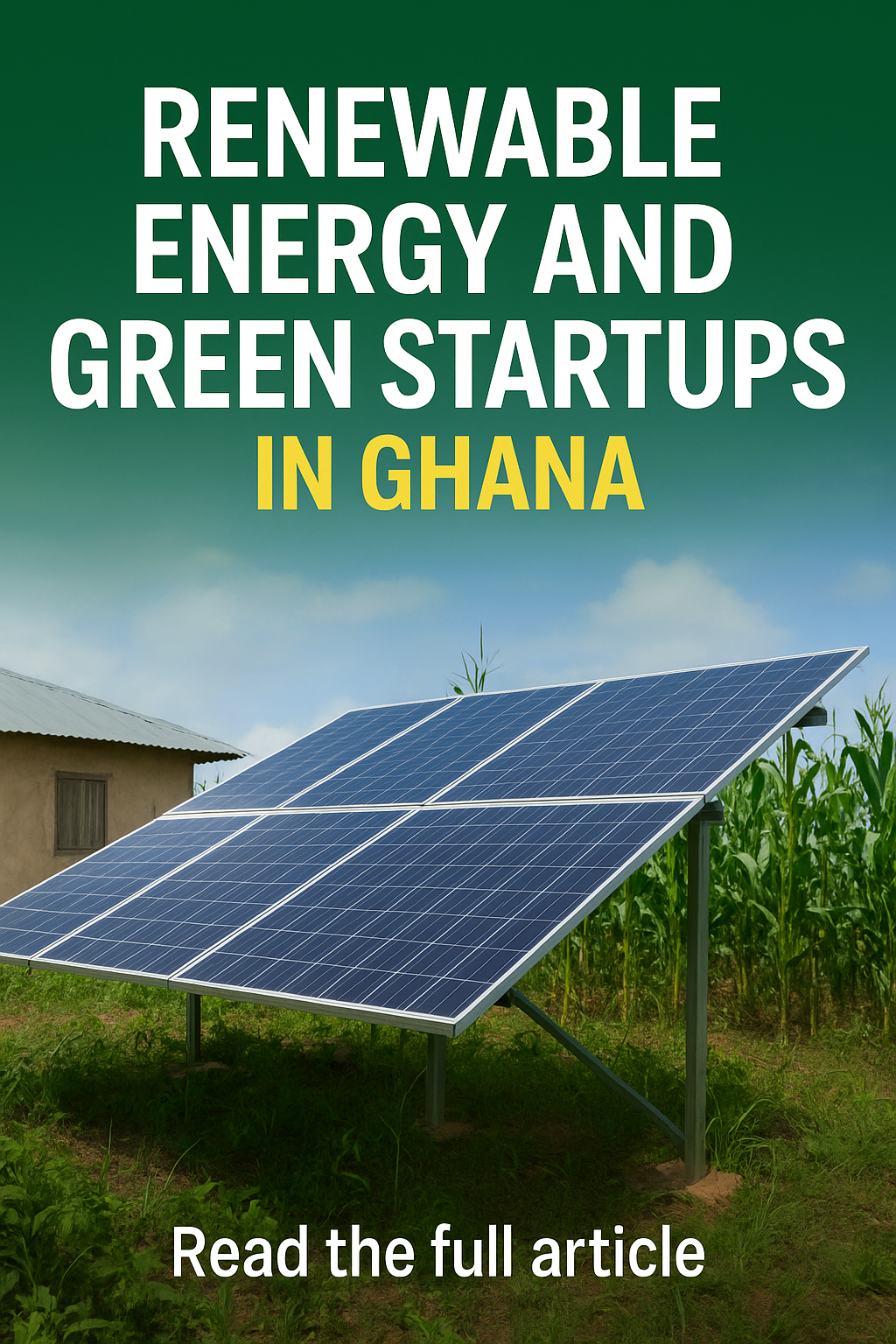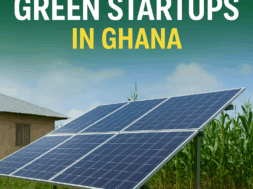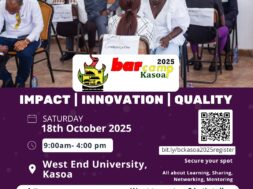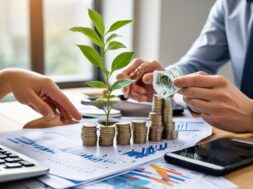Renewable Energy and Green Startups: Powering Ghana’s Sustainable Future

Renewable Energy’s Role in Ghana’s Future
Ghana’s growing economy and rapidly expanding population are creating an urgent need for sustainable energy solutions. Traditional power sources such as hydro and thermal still dominate, but rising demand highlights the necessity of cleaner, renewable alternatives.
Rising energy demand and sustainability goals
With more than 70% of Ghana’s population gaining access to electricity, demand continues to outpace supply. Renewable energy offers a pathway not only to bridge this gap but also to align with global climate commitments and Ghana’s National Energy Transition Plan.
Why renewable energy is critical for development
Renewable energy reduces dependency on fossil fuels, cuts greenhouse gas emissions, and supports sustainable economic growth. It also creates jobs, empowers rural communities, and drives innovation through green startups.
Solar Energy for Rural Communities
Off-grid solar bridging the energy gap
In rural Ghana, access to the national grid remains limited. Off-grid solar systems are transforming lives by providing affordable, reliable electricity for homes, schools, and businesses.
Startups and NGOs leading rural electrification
Companies like PEG Africa, Black Star Energy, and SunPower Innovations are deploying solar mini-grids and pay-as-you-go solar systems. NGOs and donor programs, including USAID Power Africa and the Renewable Energy Association of Ghana (REAG), complement these efforts with technical and financial support.
Success stories from Northern and rural Ghana
Northern Ghana has witnessed life-changing impacts from solar adoption, powering irrigation systems, cold storage for farmers, and clean lighting for households. These solutions reduce reliance on kerosene lamps and generators, improving both health and productivity.
Waste-to-Energy Entrepreneurship
Turning plastic, agricultural, and municipal waste into power
With waste generation rising in urban areas, innovators are converting plastic, crop residue, and municipal waste into bioenergy. These initiatives tackle two challenges at once: waste management and sustainable energy production.
Recycling and bioenergy opportunities for startups
Green startups in Accra and Kumasi are piloting projects that turn cassava peels, cocoa husks, and household waste into biogas or electricity. Such circular economy models create value while reducing environmental hazards.
Policy support and government initiatives
The Ghanaian government, through the Ministry of Energy and the Environmental Protection Agency (EPA), has introduced policies to encourage waste-to-energy projects. Pilot initiatives in Kumasi and Accra demonstrate strong potential for scaling up.
Electric Vehicles and Clean Mobility
Slow but steady growth of EV adoption
While electric vehicles (EVs) are still rare in Ghana, interest is growing. The high cost of fuel and global shifts toward clean energy are creating momentum for EV adoption, especially in urban centers.
Local startups pioneering sustainable transport
Startups like Solar Taxi Ghana are at the forefront of EV innovation, providing affordable electric transport options, including motorbikes and cars, powered by solar charging stations.
Partnerships with international EV firms
Global collaborations are emerging, with international companies showing interest in Ghana’s EV market. These partnerships are helping to introduce charging infrastructure and transfer technical know-how.
Challenges in Renewable Energy and Green Startups
High investment costs and financing gaps
Renewable energy technologies often require substantial upfront investments, making it difficult for startups to scale. Access to affordable financing remains a major bottleneck.
Policy inconsistencies and regulatory barriers
Despite supportive policies, frequent regulatory shifts and unclear frameworks create uncertainty for investors and entrepreneurs. Consistent policies are essential to build investor confidence.
Consumer awareness and education challenges
Many Ghanaians are still unfamiliar with renewable energy technologies, which slows adoption. Consumer education campaigns are crucial to encourage households and businesses to embrace clean energy solutions.
Future Outlook for Green Entrepreneurship in Ghana
Climate change as a driver of innovation
Climate change challenges are pushing entrepreneurs to develop climate-smart energy solutions, from solar irrigation pumps to eco-friendly stoves.
AfCFTA opportunities for clean energy exports
With the African Continental Free Trade Area (AfCFTA) in place, Ghana’s startups can scale across borders, tapping into wider markets for renewable energy products and services.
Youth-led startups shaping the future
Young innovators are leading the way in solar, waste-to-energy, and EVs, creating both environmental and economic impact. Programs like the Ghana Climate Innovation Center (GCIC) and UNDP-supported initiatives are equipping youth with resources to build green businesses.
You can also read on: https://baobabentrepreneur.com/fintech-and-mobile-money-innovations-driving-ghanas-digital-finance-revolution/
Case Studies of Green Startups in Ghana
PEG Africa – Expanding Off-Grid Solar Access
PEG Africa is one of the most recognized renewable energy startups in West Africa. By offering pay-as-you-go solar kits, PEG has reached thousands of off-grid households across Ghana. Families can pay small amounts daily or weekly, making clean energy accessible and affordable.
Solar Taxi Ghana – Driving the EV Revolution
Founded in Accra, Solar Taxi Ghana is an innovative startup offering solar-powered electric vehicles for urban transport. The company focuses on affordability and sustainability, targeting students, delivery services, and ride-hailing drivers. Its solar charging hubs reduce reliance on imported fuel, lowering costs for drivers and cutting emissions.
Black Star Energy – Rural Electrification through Mini-Grids
Black Star Energy has pioneered the use of solar mini-grids to electrify rural communities. These grids power households, businesses, and schools, enabling local economic activities such as milling and refrigeration. By providing 24-hour power, the startup supports both social and economic transformation in underserved regions.
International Partners Supporting Renewable Energy in Ghana
World Bank and IFC Investments
The World Bank and International Finance Corporation (IFC) have provided funding for renewable energy projects in Ghana, including solar farms and waste-to-energy initiatives. Their investments aim to reduce dependency on imported fossil fuels while expanding access to clean power.
GIZ and USAID Programs
The German development agency GIZ and USAID’s Power Africa program have played critical roles in technical training, funding, and knowledge-sharing. These initiatives help startups access markets, refine business models, and adopt cutting-edge technologies.
African Development Bank (AfDB) Initiatives
The AfDB has prioritized renewable energy financing across Africa, with Ghana positioned as a key beneficiary. Funding has gone into solar and mini-grid projects, along with support for youth-led green startups.
How Renewable Energy Supports Ghana’s Economic Growth
Job Creation and Entrepreneurship
Renewable energy and green startups create new employment opportunities across sectors—from solar technicians and EV mechanics to waste recyclers and clean energy entrepreneurs. These jobs are particularly vital for the youth demographic, which makes up a large percentage of Ghana’s population.
Reducing Energy Import Costs
Ghana spends significant amounts on importing oil and gas. By investing in renewables, the country can save foreign exchange while boosting domestic energy security.
Positioning Ghana as a Regional Leader
Through innovative startups and policy alignment, Ghana has the potential to become a renewable energy hub in West Africa, exporting solutions to neighboring countries under AfCFTA.
Predictions for the Next Decade
- Solar will dominate rural electrification: Off-grid systems will expand to cover more than 30% of unelectrified rural households by 2035.
- Electric mobility adoption will accelerate: With global EV prices falling, Ghana will see wider adoption of electric motorbikes and taxis.
- Waste-to-energy will scale up: Municipalities in Accra and Kumasi will adopt large-scale waste-to-energy plants to reduce landfill pressures.
- Youth innovation will shape the green economy: Startups led by young entrepreneurs will drive climate-smart technologies, making Ghana a continental leader in sustainable entrepreneurship.
Final Thoughts
The renewable energy and green startup ecosystem in Ghana is more than an environmental initiative—it is a pathway to economic resilience, youth empowerment, and regional leadership. With continued support from government policies, international partners, and private investors, Ghana can transition into a sustainable energy powerhouse.
The next decade will be decisive. If Ghana nurtures its green innovators and scales renewable technologies, the nation will not only meet its domestic energy needs but also lead Africa into a clean, green future.
Conclusion
The growth of renewable energy and green startups in Ghana is transforming the country’s economic and environmental landscape. From solar electrification in rural areas to innovative waste-to-energy solutions and the rise of electric mobility, Ghana is laying the foundation for a sustainable energy future. While challenges remain, the opportunities for green entrepreneurship are immense, especially for the youth driving innovation.
If nurtured with consistent policies, financing opportunities, and public awareness, Ghana can position itself as a leader in Africa’s clean energy revolution.
















